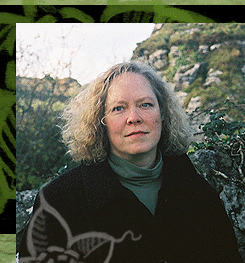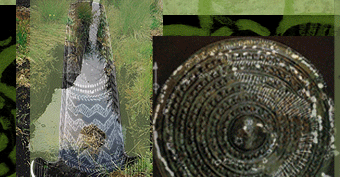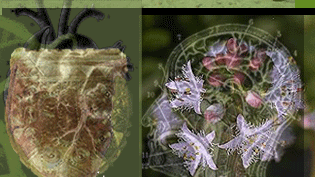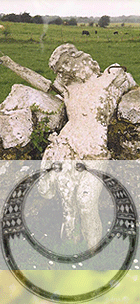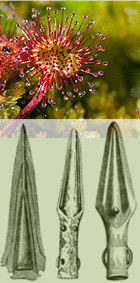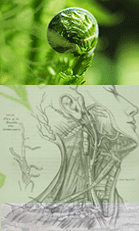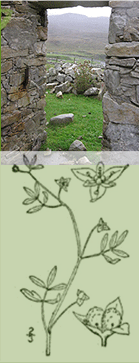One of the first questions asked at readings is how to pronounce the name of Una McGann's daughter Aoife, from Haunted Ground. For the record, it's 'EE-feh.'
Here's a handy pronunciation guide for the other names, and a short glossary with definitions for some of the other possibly unfamiliar words you'll find in the books. If you find any mistakes, or would like to see other names or expressions added, let me know!
![]()
Pronunciation of Proper Names
Áine................................................... ON-yeh
Áine Rua ............................................ ON-yeh ROO-ah
Aoife .................................................. EE-feh
cáilín rua ............................................ COLL-een ROO-ah
Cathal Mór ............................................ CA-hal MORE
Ciaran ..................................................... KEER-ahn
Colmcille ................................................ COLL-um-KILL
Cormac ................................................... COR-muck
Cormach .................................................. COR-muck
Cosnamach ................................................ COS-na-muck
Deasy ..................................................... DEE-zy
Declan .................................................... DECK-lan
Devaney .............................................. duv-VAN-ney
Eamonn .................................................. AY-monn
Éilis ....................................................... AY-lish
Ferghal .................................................. FER-gal
Francie Dearg and Mici Bán............. Francie JAR-ug and MICK-ey BAWN
Gráinne........................................... GRON-yeh
Mag Annaigh ........................................... mag-AN-na
Mairéad ........................................... muh-RAY-ed
Malachy ................................................. MAL-uh-key
Niall ...................................................... NILE
Nuala .................................................... NOO-lah
Ó Flaitheartaigh ................................... oh-FLAH-her-ty
Ó Floinn ................................................ oh-FLYNN
O'Rafferty ............................................ oh-RAFF-er-ty
Orla ...................................................... OR-lah
Pádraig ....................................... POUR-ig or PAW-drig
Páidín .................................................... PAW-jeen
Peadar ................................................... PAD-ar
Roisín ..................................................... RO-sheen
Saoirse ..................................................... SEER-shuh
Síle Mhicí Uí Ghallchóir ............SHEE-lah VICK-ee uh GAL-ah-her
Tómas Ó Flic ................................... to-MAHSS oh-FLICK
Tríona .................................................... TREE-nah
Una ........................................................ OO-nah
![]()
A Short Glossary
Some of these words might be unfamiliar to readers, so I've tried to explain them as best I can.
A B C D E/F G H I/J/K/L M N O P/Q R S T U/V/X/Y/Z
(Click the letters above to jump to that section)
adipocere: a yellow or brown wax-like organic substance formed by the anaerobic bacterial hydrolysis of fat in animal tissue, such as body fat in corpses (sometimes also known as corpse, grave or mortuary wax)
after (doing something): to have just done something, e.g., "I'm just after having me dinner."
Amhrán Thoraí: (pronounced OW-ron HO-ree) means 'Song of Tory (Island)'
aisling songs: allegorical songs, usually depicting Ireland as a beautiful young woman; the Irish word aisling (pronounced ASH-ling) means 'vision'
amadán: (AHM-uh-don) a fool or an idiot
An Feadán Mór: (un FAD-dan more) a place name, meaning 'the big tube,' and probably referring to a land formation that's like a gully. The term 'fead´n' is also used when talking about pipes or whistles.
Ann´la Ríoghachta Éireann/Annals of the Four Masters: Chronicles of medieval Irish history, spanning from the Deluge (dated as 2,242 years after creation!) to AD 1616. Written in the Irish language, they track many important events in Irish history.
anseo: (ahn-SHO) here
Aosd´na: (EES-donna, from the Irish 'aos d´na,' or people of the arts) an association of Irish artists, founded in 1981. An academy of sorts, in that it only allows current members to invite new members. Currently limited to 250 individuals.
ascender: the portion of a minuscule letter in a Latin-derived alphabet that extends above the mean line of a font. That is, the part of a lower-case letter that is taller than the font's x-height. Ascenders, together with descenders, increase the recognizability of words.
atin': eating, as in the expression, "having his cake and atin' it too"
aubergine: French word for eggplant, generally used in Britain and Ireland
aul wan: mother
auripigmentum: from the Latin words for gold + pigment, the medieval name for the mineral substance arsenic sulfide, also known as orpiment, used as gold pigment in ancient manuscripts
azurite: a mineral that consists of blue basic carbonate of copper; used as a pigment in ancient manuscripts
bán: (BAWN) meaning white, or fair-haired
banbh: (BAHN-uv) a piglet
banshee: from the Irish bean sí (literally 'fairy woman'), a weeping harbinger of death
base-batter: foundation stones, as in a tower house, which are broader at the bottom than the top
bate of it, did you ever see the: anything to beat it, in other words, anything more astonishing
bawn wall: a defensive wall around a medieval castle
bawn-coloured: from the Irish bán, meaning 'white'
beag: Irish word for 'small'
belt of a seedy beet: a blow given with a sugar beet plant gone to seed
biro: (pronounced BY-ro) a pen, a ballpoint
blackguard: (pronounced 'blaggard') scoundrel or villain
blás: (BLAHSS) Irish word for flavor; in music, the proper style and soulful expression
boilersuit: A loose-fitting garment covering the whole body except for the head, hands and feet, worn by workmen in Irish factories and farms
bollocks: actually refers to male genitalia, but used many different ways; "Ah, that's a load of bollocks!" etc., and as a general expression of dismay
boot: trunk (of a car)
Bord na Móna: the Irish Turf Board, which harvests peat for burning in power plants
boyo: a bit of a lad, a man of loose morals
brack: (originally 'barm brack') a sweet cake made with currants
Bracklyn: (BRACK-lin) from the Irish breac linn, meaning 'speckled place'
brat: an Old Irish word for 'cloak'
Brehon: the Irish language word for 'judge.' The Brehons were part of a system of laws before English law was used in Ireland.
Brigid's cross: a simple woven cross made of straw or rushes
bugallas: Spanish word for oak galls
busman's holiday: a holiday on which a person also has to work
busy Lizzies: impatiens
cailín rua: (COLL-een ROO-ah) literally, 'the red girl' in Irish, i.e., the red-haired girl
caput humeri, tuberculum majoris, infra spinatus, teres minor: Latin names for bones of the human arm
car hire: automobile rental
carry: gave a lift (in a car)
carrier bags: thin plastic bags with handles
cashpoint: Irish term for ATM (automatic teller machine)
ceann, (as in, 'lose the ceann'): (KYOWN) ceann is the Irish 'head'; to lose one's head, lose control
Ceili, Ceili House: in Irish, ceilí (pronounced KAY-lee) is a term for a social gathering or party; it's now come to mean more specifically a dance with live music. "Ceili House" is a radio programme of traditional ceili band music
Celtic Tiger: a term for the recently thriving Irish economy
chevaux-de-frise: (from cheval-de-frise, literally, 'horse of the Frisians') an obstacle, stone or wooden board with projecting spikes, to hinder enemy horsemen, originally used by the Frisians against Spanish cavalry
chevrette: French word for she-goat
chipper: a fast-food restaurant
chroí: (CHREE) from croí, the Irish word for heart; mo chroí, 'my heart'
Choum reap suor/Choum reap lir: traditional Khmer greeting/parting words
Cill Eóghain: (kill-OWE-en), translated into English as Killowen; meaning 'the church of Owen'
ciúnas: (CYOON-as) Irish word for 'silence'
cinnabar: red mercuric sulfide used as a pigment
Clanricardes: descendants of Richard de Burgo, a Norman nobleman who settled in Galway
Clonmacnoise: (CLON mac-NOISE, from Cluain Mhic Nóis in Irish, meaning 'Meadow of the Sons of Nós') a famous monastery on the banks the River Shannon south of Athlone. Clonmacnoise was founded in 546 by Ciar´n, a young man from Rathcroghan, Co. Roscommon. Until the 9th century it had close associations with the kings of Connacht. The strategic location of the monastery helped it become a major centre of religion, learning, craftsmanship, and trade.
Coarb: (from the Old Irish comarbae, meaning 'heir' or 'successor'), a distinctive office of the later medieval church among the Gaels of Ireland and Scotland
coddin': having someone on, joking
collect: pick up or give a lift (in a car)
Connacht: (CON-acht) also spelled Connaught, one of Ireland's four provinces
cooker: stove
corbel: a projection built out from a wall as a bracket to support a beam or roof-truss
corncrake: an elusive meadow bird of western Europe
cowshite: manure
craic: (CRACK) conversation, chat
craythur: (CRATE-her) Irish way of saying 'creature,' especially an individual for whom one feels pity
crottin: A French word for a pungent cheese made of goat's milk and formed into small disks
crozier: (also spelled 'crosier') a ceremonial staff carried by a bishop or abbot, hooked at one end like a shepherd's crook
cumdach: (CUV-dach) or book shrine is an elaborate ornamented box or case used as a reliquary to enshrine books regarded as relics of the saints who had used them in Early Medieval Ireland
cuppa: a cup of tea
curandero: a Mexican man who practices healing techniques inherited from the Mayans
da: Irish term for father, probably shortened from 'dada' or 'dadai,' pronounced "daddy"
daft: crazy
deal of (something): a good number, a lot
dearg: (JAR-ug) meaning red (as in red-haired)
delft: glazed earthenware, usually blue and white, after the crockery produced in Delft, Holland; has come to refer in Ireland to any kind of dishware
demesne: the land around a mansion belonging to an estate
descender: In typography, a descender is the portion of a letter that extends below the baseline of a font. The line that descenders reach down to is known as the 'beard line.' In the letter y, for example, the descender would be the 'tail.'
dickie bow: bow tie
Dinnsenchus: also known as Dindsenchas or Dindshenchas, meaning 'lore of places' (the modern Irish word dinnseanchas means 'topography') is a class of texts from early Irish literature, recounting the origins of place names and traditions concerning events and characters associated with those places, and an important source for the study of Irish mythology
dogsbody: a menial worker, drudge
donkey's years: a long time
dosh: slang term for an amount of money
dote: a sweet, lovely person
draíocht: (DREE-ocht) the Irish word for 'enchantment'
Drumcleggan: Irish place name meaning 'ridge of the skull'
Dúchas: (DOO-chus) the Heritage Service; the government body which oversees historic sites in Ireland
Dun Aengus: (DUN ENG-us) aka Dún Aonghasa, or 'Fort of Angus' in Irish, a prehistoric promontory fort on the edge of Inishmore, the largest of the Aran Islands
Dunbeg: Irish place name meaning 'small fort'
dustbin: trash can
EC: the European Community, also known as the European Union, or EU
eejit: an idiot
Éile Uí Chearbhaill: aka 'Ely O'Carroll, an ancient kingdom of the O'Carrolls in northwest Tipperary
Éiru: ancient name for Ireland
ensuite: (ON-sweet), after the French pronunciation, meaning that the lavatory is inside one's sleeping quarters, and not out in the hall
Eóghan: (OWE-en) Irish man's name, sometimes spelled Eoin, and usually taken as the Irish equivalent for the English name 'John'
epigastric: upper central portion of the abdomen
eToll: automated toll-road payment system in Ireland; uses a small electronic tag placed in a vehicle, detected each time the vehicle passes through a toll plaza
exsanguination: the process of blood loss, to a degree sufficient to cause death
fag: cigarette
fromager: (FRO-mah-zhay) French word for a man who makes cheese; feminine form is 'fromagère'
fuck-wit: a dolt, an idiot
furze bushes: Ulex europaeus, or aiteann gallda in Irish, a prickly green bush with yellow flowers, also called gorse or whin
Gaelscoil: school in which all subjects are taught in the Irish language
Gaillmh: (GALL-yuv) Irish name for Galway
gallotannic acid: the tannic acid contained in gallnuts
Garda Síochána: (GAR-dah shee-oh-CAHN-nah) Ireland's national police force
Gardaí: (gar-DEE) plural form of Garda, policeman
garderobe: a privy built in the wall of a medieval castle
gawping: gawking, staring
ginger: red, as in red hair
Go mbéirimid beo ar an am seo arís: (Go MER-ih-mid bYO err ahn AHM-show a-REESH) An Irish expression, meaning 'May we all be alive this time next year'
gob: mouth; from the Irish word gob, which means a bird's beak or bill
gobshite: someone who talks nonsense, an idiot
Goilín: (GO-leen) a singer's club that meets weekly in Dublin
golden pages: advertising telephone directory; Yellow Pages
gombeen: idiot
grá: (GRAH) love
gran: Irish term for grandmother
grassing up: informing on someone to the authorities, snitching
haggard: from Ireland and the Isle of Man, an enclosure beside a farmhouse in which crops are stored
harper: a person who plays Gaelic harp, especially the ancient wire-strung harp
HB Ice Cream: a common type of frozen confection sold at newsagents and sweet shops
hire-purchase: rent-to-own
histopathologic: refers to microscopic examination of tissue in order to study the manifestations of disease
hooded crow: Corvus corone, or Feannóg in Irish, a common type of crow with grey body and black wings and head
hoor: whore
hoormonger: whore-monger, pimp
hoovering: running a vacuum-cleaner
Hunger, The: more accurate name for the Irish Potato Famine
hurley: a stick with a rounded end, used in the Gaelic game of hurling
hurling ball: small round leather ball used in the Gaelic game of hurling, also called a sliothar (SLIT-thar) in Irish
Imbolc: (IH-molk or IH-molg), also called Saint Brigid's Day, a Gaelic festival marking the beginning of spring, most commonly held on 31 January-1 February, or halfway between the winter solstice and the spring equinox
infraumbilical: below the navel
interphalangeal joint: the hinge joints between the phalanges of the hand or foot (i.e., finger or toe bones)
in ualle lacrimarum in loco quem posuit: From Psalm 83; translated from Latin, it means 'In the vale of tears, in the place which he has set'
jack the lad: a boyo, a ladies' man
jackdaw: Corvus monedula, or Cág in Irish, a small type of crow; known for collecting shiny objects in its nest
Jaysus: Jesus
John O'Donovan: (25 July 1806—10 December 1861), from Atateemore, in the parish of Kilcolumb, County Kilkenny, and educated at Hunt's Academy, Waterford, was an Irish language scholar and antiquarian from Ireland who worked for the Ordnance Survey (mapmaking body). He worked for the Survey on place-name research until 1842, unearthing and preserving many manuscripts, researching maps and manuscripts at many libraries and archives in Ireland and England, with a view to establishing the correct origin of as many of Ireland's 63,000 townland names as possible. His letters are regarded as an important record of the ancient lore of Ireland for those counties he documented during his years of travel throughout much of Ireland
journos: Irish slang term for journalists
jumper: a sweater
kaffir: from the Arabic word for 'infidel,' and originally used as a descriptive term for a particular ethnic group; has come to be used as an abusive and contemptuous term for any person of color (primarily in Africa)
knackered: tired, worn out
knotwork: intricated interlaced shapes and figures used by Irish monks in their manuscripts; usually associated with infinity
lamina propria: part of the moist linings known as mucous membranes or mucosa, which line various tubes in the body such as the alimentary canal, and including the surface of the tongue
lapis: from lapis lazuli, a semiprecious stone that is usually rich azure blue, used as a pigment in ancient manuscripts
leaving cert: an examination at the end of secondary school in Ireland
legless: drunk
léigh: (LAY) the Irish verb 'to read'
leine: (LEN-yeh) a medieval Irish garment, a loose-fitting, gathered shirt usually worn to about the knee, often belted or worn under a jacket or cloak
Liber sextus: from the Latin, meaning 'Book Six'
livor mortis: a settling of the blood in the lower portion of the body, causing a purplish red discoloration of the skin
lok: an honorific title in Khmer, roughly equivalent to 'mister'
lorry: truck
luminaria: a small paper lantern, commonly a candle set into sand inside a paper bag
mac: a Mackintosh or Macintosh (often abbreviated as mac or mack), a form of waterproof raincoat, first sold in 1824, made out of rubberised fabric
machicolation: in medieval military architecture, a series of openings in a stone parapet, through which missiles or boiling liquid could be dropped onto the heads of assailants beneath.
mad drunk: blotto, three sheets to the wind
maggotty: mad drunk
majescule: in calligraphy, the uppercase, capital, or large letter, in contrast to the minuscule, lowercase, or small letter
make a haymes (of something): make a mess of, foul up
malachite: a green mineral, a basic carbonate of copper used as a pigment in ancient manuscripts
Mamaí: Irish word for mother; pronounced 'mammy'
midden: refuse heap left by a prehistoric settlement
midge: a small, two-winged, gnat-like insect
milagroso: miraculous (Spanish)
Moleskine: a brand of leather-bound journals
motte: an artificial mound of earth fortified as a castle; in earlier times sometimes with timber stockade, usually later with stone tower or keep
mullion: in medieval and early Renaissance architecture, a vertical bar of wood or stone dividing a window opening
N6: one of the main arterial highways in Ireland
naggin of whiskey: a small bottle of the pure drop
nappy: a baby's diaper
narky: cranky
navvy: a shorter form of navigator (UK) or navigational engineer (US), is particularly applied to describe the manual labourers working on major civil engineering projects; also commonly used to refer to a laborer who is worked exceptionally hard
Nisifortinus: disciple and scribe who worked with John Scottus Eriugena, disciple anonymous but referred to by the initial of his hand, i2, and sometimes called Nisifortinus, for the way he introduced some of his corrections by the polite formula 'Nisi forte quis dixerit'—'Unless, perhaps, anyone shall say that...'
nitrile: material used in latex-free laboratory and medical gloves
Ó Beigléighinn: (O BEG-lan) Irish surname meaning 'descendent of the little scholar'
oiche mhaith: (EE-heh wah) Irish for 'good night'
Orangeman: member of a fraternal Orange lodge in the North of Ireland, usually associated with Unionist politics
Ortha na nGael: ortha can mean 'prayers' or 'charms' or 'songs' because in ancient times these things were one and the same; the full title is usually translated 'Prayers of the Gaels' or "Songs of the Gaels'
óstan: an inn or hostel
papillae: nipple-like nubs on the surface of the tongue that contain the taste buds
passing remarks: making comments, either in front of someone or behind their back
peg: to throw
Periphyseon: also known as De divisione naturae ('The division of nature') the great work of ninth century theologian and philosopher John Scottus Eriugena
petechial: a small purplish spot on a body surface, such as the skin or a mucous membrane, caused by a minute hemorrhage
petrol: gasoline
pillock: a stupid person
planters: settlers brought in to Ireland by the English government
poncing: behaving in a ridiculous, ineffective, or posturing way
Port na Rón: (PORT na RONE) Harbor of the Seals, a setting in FALSE MERMAID
porter: a dark brown beer made from charred or browned malt; stout; Guinness is one example
Portlaoise: (port-LEASH) town in Co. Laois, site of a prison and psychiatric hospital
préachán: (PRAY-uh-con) Irish word for crow or rook
prie-dieu: a kneeler, as used in a church or confessional
Provos: Provisional Irish Republican Army
punters: gamblers, drinkers at a pub
punts: Irish monetary unit, also known as pounds or #IR
quare: queer or strange
queue: to stand in line
Raidió na Gaeltachta: Irish language radio network
Radio Éireann: the old name for Raidió Telefís Éireann, the Irish national
broadcasting service, before the age of television
rake: a lot, a load, as in "You're a rake of trouble, young fella."
Ranelagh: (RAN-uh-lah) a neighborhood in Dublin
rashers: Irish bacon
red lake: a red pigment manufactured by precipitating dye with an inert binder, or mordant, usually a metallic salt
ringfort: an early medieval earthwork fortification, usually built between AD 500-1000
RTÉ: Raidió Telefís Éireann, the Irish national broadcasting service
rua: (ROO-ah) can refer to a red-haired person, or something of a reddish-brown, russet color; madra means 'dog' in Irish, and madra rua is a fox
rushy glen: a glen, or valley, filled with rushes, any of several flowering plants distinguished by cylindrical stalks or hollow, stemlike leaves, found in temperate regions and particularly in moist or shady locations
saag chicken and garlic naan: Indian food; chicken cooked with spinach, and a flat bread made with cloves of garlic
Samhain: (SAHW-en) a Gaelic festival marking the end of the harvest season and the beginning of winter or the 'darker half' of the year, most commonly held 31 October-1 November, or halfway between the autumn equinox and the winter solstice
Sassenach: (SAHSS-en-ach) Irish word for Saxon, the old term for English settlers in Ireland, and usually not meant in a nice way...
scarper: to run away, decamp
scree: also called 'talus;' a sloping mass of loose rocks at the base of a cliff
scullery: a room adjoining the kitchen where pots and pans are scrubbed and stored
scurl: term that describes the sound of bagpipes
scut work: the worst work
scutch: rough wood and brush
schmozzle: a Yiddish word meaning 'muddle' or 'quarrel'
secondment: the detachment of a person (a military officer, government worker, etc.) from a regular organization for temporary assignment elsewhere
Senchus Mór: (SHEN-cus MORE) a set of early Irish law texts, compiled in a group sometime in the 8th century
shite: shit
shower of shites: a group of people who behave in a less-than-exemplary manner
síle-na-gig: (SHEE-lah na GIG) an ancient female fertility symbol
sin é: (shin AY) Irish for 'that's it'
skint: broke, penniless
slag: a woman of loose morals
slag heap: a pile of fused refuse or dross separated from metal in the process of smelting
slagging, to slag: teasing; to tease or heckle
slapper: a woman of loose morals
slash: 'going for a slash' = urinating
sleán: (SLANE or SLAWN) turf-spade; used for cutting turf for fuel
Smithwicks: (SMITH-icks) Irish brand of ale
snug: a booth in a pub
spanner: a crescent wrench
splodges: Irish/British variant of 'splotches'
squireen: an Irish diminutive of squire, or country gentleman; not a compliment
St. Manchan: also known as Saint Manch´n mac Sillain (died 664), an early Irish saint and patron of Liath Manch´in, now Lemanaghan, in County Offaly, said to have founded his monastery in AD 645
Stephen's Day: the feast day of Saint Stephen, December 26; a traditional day of revelry in Ireland when bands of local men and boys would dress up and go out 'hunting the wren', and amuse the neighbors with music and song
suss out: to investigate
susto: an idiom of distress principally reported among Latinos in the U.S. and Latin America. Susto is an illness attributed to a frightening event that causes the soul to leave the body, leading to symptoms of unhappiness and sickness. Symptoms are extremely variable and may occur months or years after the supposedly precipitating event
stocious: yet another word for drunk
10p coin: an Irish ten-pence piece
12th of July: the day the Orange lodges march to commemorate the victory of William III over the Catholic King James at the Battle of the Boyne in 1691
take the piss (out of someone): to tease or make fun of someone
Taoiseach: (TEE-shuck) Irish word for leader; ruler; now a political position similar to prime minister
Templemore: town in Tipperary where the Irish police (Garda Síoch´na) academy is located
termon: from the Irish, meaning 'place of sanctuary,' also known as 'cross lands' of the ancient monastic houses in Ireland
Tir na nÓg: (TEER na NOGE) the legendary Land of Youth from Irish mythology
Tom O'Bedlam: used to describe beggars and vagrants who had or feigned mental illness who claimed, or were assumed, to have been former inmates at the Bethlem Royal Hospital (aka Bedlam)
topping, to top (someone): killing, to kill someone
torch: flashlight
tosser: an objectionable male person, often somewhat obnoxious in demeanor, interchangeable with 'wanker'
tow-rag: someone who plays it safe and follows the status quo; a yes-man
townsland: township, a section or area outside town limits
tuberosities: rounded prominences on a bone usually serving for the attachment of muscles or ligaments
turbary: the ancient right to cut turf, or peat, for fuel on a particular area of bog, also described legally as 'common of turbary', often associated with commonage, or land held in common
UCD: University College Dublin, now part of the National University of Ireland
UCG: University College Galway, now part of the National University of Ireland
uilleann pipes: (ILL-an pipes) a type of Irish bagpipe filled with a bellows strapped to the arm; uilleann is the Irish word for 'elbow'
under obso: under observation
![]()
virescent: to become green
vitae aeternum: from Latin, 'eternal life'
![]()
Weetabix: brand-name of a prepared cereal similar to Shredded Wheat
whisht: hush, keep quiet
woad: European herb (Isatis tinctoria) of the mustard family grown for the blue dyestuff yielded by its leaves; also the dyestuff made from it
yoke: general term for 'thing', as in "Would you ever hand me that yoke?"
